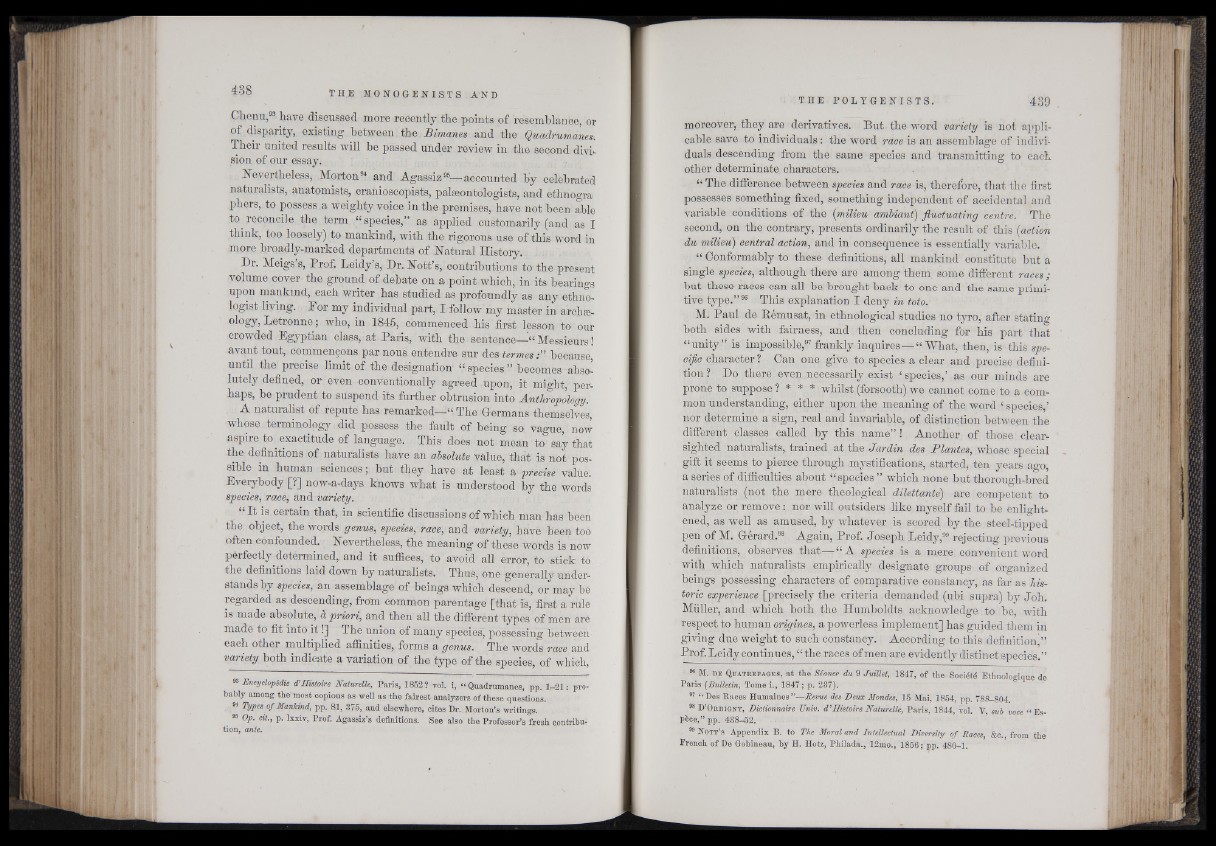
Chenu,93 have discussed more recently: the points of resemblance, or
of disparity, existing between the.Bimanes and the Quadrumanes.
Their united results will be passed Under review in the second division
of pur essay.
Nevertheless, Morton94 and Agassiz95—accounted by celebrated
naturalists, anatomists, cranipscopists, palaeontologists, and ethnogra
phers, to possess.a weighty voice in the premises, have not been able
to reconcile the term “ species,” as applied customarily (and as I
think, too loosely) to mankind, with the rigorous use of this word in
more broadly-marked departments of Natural History.
Dr. Meigs s, Prof. Leidy’s, Dr. Nott’s, contributions to the present
volume cover the ground of debate on a point, which, in its bearings
upon mankind, each writer has studied as profoundly as any ethnologist
living. F or my individual part, I follow my master in arcbæ-
°l°gy> Letronne ; who, in 1845, commenced his first lesson to our
crowded Egyptian class, at Paris, : with the sentence—“ Messieurs !
-avant tout, commençons par nous, entendre sur des femes;” because,
until the precise limit of the designation “ species” becomes absolutely
defined, or even conventionally agreed upon, it might, perhaps,
be prudent to suspend its further obtrusion into Anthropology.
A naturalist of repute has remarked—“.The Germans themselves,
whose terminology did possess the fault of being so vague, now
aspire to exactitude of language. This does not mean to say that
the definitions of naturalists have an absolute vàltie, that is not possible
in human sciences ; hut they have at least a precise value:
Everybody [?] now-a-days knows what is understood by the words
species, race, and variety.
■ “ It is.certain that, in scientific discussions of which man has been
the object, the words genus, species, race, and variety, have been tod
often confounded. Nevertheless, the meaning of these words is now
perfectly determined,: and it suffices, to avoid all error, to stick to
the definitions laid down by naturalists. Thus, one generally understands
by species, an assemblage of beings which descend, or may bé
regarded as descending, from common parentage [that is, first a rule
is made absolute, à priori, and then all the different types of men are
made to fit into it !] The union of many species; possessing between
each other multiplied affinities, forms a genus. The words race and
variety both indicate a variation of the 1ype of the species, of which,
93 Encyclopédie ¿’Histoire Naturelle, Paris, 1852? vol. i, “ Quadrumanes, pp..1-21: probably
among the'most copious as well as the fairest analyzers of these questions.
94 Types of Mankind, pp. 81, 376, and elsewhere, cites Dr. Morton’s writings.
Op. dt., p. lxxiv, Prof. Agassiz’s definitions. See also the Professor’s fresh cpntribur
tion, ante.
moreover, they are derivatives. But the word variety is not applicable
save to individuals : the word race is an assemblage of individuals
descending from the same species and transmitting to each
other determinate characters.
“ The difference between species and race is, therefore, that the first
possesses something fixed, something independent of accidental, and
variable conditions of the (milieu ambiant) fluctuating centre. The
second, on the contrary, presents ordinarily the result of this (action
du milieu) central action, and in consequence is essentially variable.
I Conformably to these definitions, all mankind constitute but a
single species, although there are among them some different races;
but these races can all he brought back to one and the same primitive
type.”96 This explanation I deny in toto.
M. Paul de Rémusat, in ethnological studies no tyro, after stating
both sides with fairness, and then concluding for his part that
“unity” is impossible,97 frankly inquires—“ What, then, is this specific
character ? Can one give to species a clear and precise definition?
Do there even.necessarily exist ‘species,’ as our minds are
prone to suppose ? * * * whilst (forsooth) we cannot come to a common
understanding, either upon the meaning of the word ‘ species,’
nor determine a sign, real and invariable, of distinction between the
different classes called by this name” ! Another of those clearsighted
naturalists, trained at the Jardin des Plantes, whose special
gift it seems to pierce through mystifications, started, ten years ago,
a series of difficulties about “species ” which none but thorough-bred
naturalists (not the mere theological dilettante) are competent to
analyze or remove: nor will outsiders like myself fail to be enlightened,
as well as amused, by whatever is scored by the steel-tipped
pen of M. Gérard.98 Again, Prof. Joseph Leidy,99 rejecting previous
definitions, observes that—“A species is a mere convenient word
with which naturalists empirically designate groups of organized
beings possessing characters of comparative constancy, as far as historic
experience [precisely the criteria demanded (ubi supra) by Joh.
Müller, and which both the Humboldts acknowledge to be with
respect to human origines, a powerless implement] has guided them in
giving due weight to such constancy. According to this definition'”
Prof. Leidy continues, “ the races of men are evidently distinct species.”
96 M- Mä Quatrbiaqes, at the Séance du 9 Juület, 1847, of the Société Ethnologique de
Paris (Bulletin, Tome i., 1847 ; p. 237).
97 “ Des Races Humaines”—Revue des Deux Mondes, 15 Mai, 1854, pp. 788-804.
98 D’Orbigny, Dictionnaire Univ. d ’Histoire Naturelle, Paris, 1844, vol. V sub voce “ Espèce,”
pp. 438-52.
99 Nott’s Appendix B. to The Moral and Intellectual Diversity of Races, &c., from the
Prench of De Gobineau, by H. Hotz, Philada., 12mo., 1856; pp. 480-1.